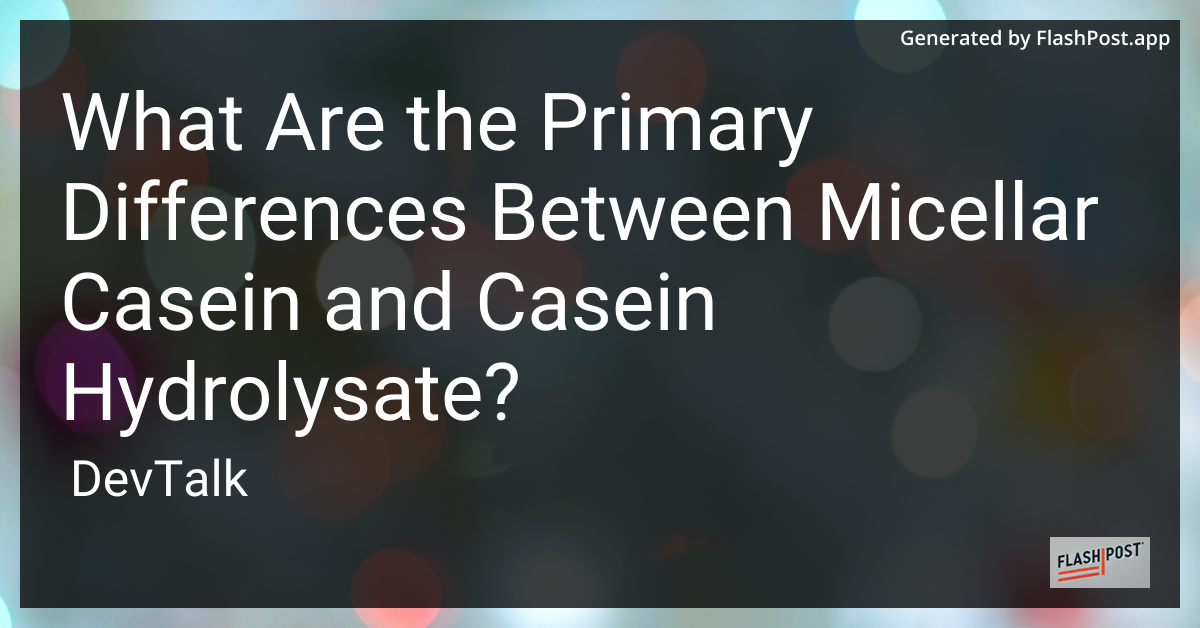What Are the Primary Differences Between Micellar Casein and Casein Hydrolysate?
 # Understanding the Primary Differences Between Micellar Casein and Casein Hydrolysate
# Understanding the Primary Differences Between Micellar Casein and Casein Hydrolysate
Protein supplements have gained significant popularity among fitness enthusiasts and health-conscious individuals.
Among these, micellar casein and casein hydrolysate are two notable forms of casein protein that cater to different dietary needs and goals. Understanding the primary differences between these two can help you make informed decisions about which supplement best suits your needs.
What is Micellar Casein?
Micellar casein is the most natural form of casein protein. It is derived from milk and minimally processed to retain its original structure. This process helps in preserving the complete protein with all its bioactive compounds. The key characteristics of micellar casein include:
-
Slow Digestion: Micellar casein is known for its slow digestion and absorption rate, providing a sustained release of amino acids. This makes it an excellent option for sustaining muscle protein synthesis during prolonged periods without food, such as overnight, to prevent muscle breakdown.
-
High Quality: Due to its natural state, micellar casein maintains a high level of bioactive peptides and essential amino acids, crucial for muscle repair and growth.
-
Thick Texture: It usually has a thicker consistency when mixed, making it suitable for a more filling protein shake.
What is Casein Hydrolysate?
Casein hydrolysate, on the other hand, undergoes an additional processing step known as hydrolysis. This process involves breaking down protein chains into smaller peptides, resulting in a distinct set of characteristics:
-
Fast Absorption: The hydrolysis process significantly enhances digestion and absorption rates, allowing for a rapid influx of amino acids to the muscles. This makes it ideal for post-workout recovery when fast protein uptake is beneficial.
-
Low Allergenic Potential: The pre-digested nature of casein hydrolysate reduces the likelihood of allergic reactions and gastrointestinal discomfort compared to other protein forms.
-
Less Thickness: It typically results in a thinner consistency compared to micellar casein, often preferred by those who find thicker shakes difficult to consume.
Making the Right Choice for Your Needs
Choosing between micellar casein and casein hydrolysate largely depends on your individual goals and preferences:
-
For Sustained Nutrition: If your goal is to support muscle maintenance and growth over extended periods without meals, such as during the night, micellar casein is your best bet due to its ability to provide a slow and steady release of nutrients.
-
For Quick Recovery: If you need a post-workout recovery boost, casein hydrolysate is more suitable thanks to its fast absorption rate, which rapidly delivers nutrients to your muscles when they need it most.
Incorporating protein supplements as part of a balanced diet could also aid in various aspects of health and wellness. For instance, protein shakes have been shown to assist with weight loss by promoting satiety and muscle retention. For more insights on how protein shakes help with weight loss, check out this detailed guide.
Related Topics
- Explore affordable maternity protein supplements options for expecting mothers eyeing nutritional support during pregnancy.
- Interested in plant-based options? Discover how to make vegan protein shakes at home.
Understanding your specific needs and preferences can help you better navigate the diverse landscape of protein supplements, ensuring that you choose the right product for your body and lifestyle.